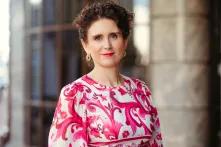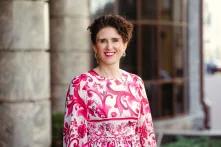In peacetime, Yuliya Sporysh made empowering young women her mission, strengthening their confidence that they can do anything they set their minds to. In pursuing this mission since 24 September 2022, she has grown into someone even more remarkable, says Jamila Schäfer in her presentation address.

I think there are a lot of us who cannot even imagine what it’s like to be in a war. When all your plans are suddenly out the window because any moment could be of existential importance.
What would it be like to fall asleep in a situation of peace and wake up in the midst of a war? I asked myself this question in the summer of 2022, as I was boarding the night train to Kyiv for the first time, in the company of my colleague, Robin Wagener.
There can be no real comparison, of course, because I was not at home when I woke up in a war, and I spent only a few days in Ukraine – that alone makes it impossible for me to have more than a faint inkling of what waking up in a war has meant for the people in Ukraine for over two years now.
I have been to Ukraine twice since 24 February 2022. On both of those trips, I had conversations and experiences that I will not soon forget.
In March of 2023, for instance, I visited a university where I spoke with school and university students about their situation since the start of the war. One student said to me: “Up until 24 February 2022, I was a completely normal political science student looking forward to his semester abroad. Since 24 February, I have been a soldier, and every day, I tell myself that it’s good to have survived another day.”
One schoolgirl told us: “Even now, with the war going on, we still go out to party sometimes. But the lightness, the ease of it is gone. You don’t make plans for very far ahead, because the struggle to survive is always there. And of course, when we do give parties, we use them to collect money to help our friends at the front.”
The youth organisations I met with were in a similar situation. They had lost many of their active members, because they had left to join the army. And the organisations, too, host a lot of activities and events to benefit the soldiers. They also want to think ahead to a time after the war though.
I noticed this when meeting other Ukrainians as well, this desire to keep thinking about a life after the war as well as what is happening now. Aleksandre, a soldier I spoke with at the Munich Security Conference, told me: “There were two things that kept me alive over the six hours that I was lying seriously wounded in a trench in Bakhmut: my love for my wife and the belief in peace. The hope that because we are going through this now my children will never have to take up arms to defend their freedom.”
I was also struck by this habit of looking ahead during my visit to the village of Kozarovychi, not far from Kyiv. Several of the houses there had been struck by missiles and were uninhabitable. But while I was visiting, the whole neighbourhood – old, young, women and men – turned out and set to work, removing the debris the missiles left behind and rebuilding the houses. Most of them did so as volunteers so that the homeowners would be able to afford to rebuild.
Before my second trip to Ukraine, my image of the war was primarily shaped by images of Zelensky, in his olive-green shirt, and of soldiers at the front. The images of heroism in the reporting in the media were predominantly images of men back then, and they still are, of course. I think this male iconography is inherent to war.
Another thing that nearly all wars have in common is the use of sexual violence as a weapon. A weapon that turns women’s bodies into a battlefield on which men demonstrate their power. Sadly, a great many Ukrainian women, and also some men, have already been made the victims of sexual violence in this war. The suffering from the resulting trauma and injuries will never end for some of the survivors and their families. Even when the war is over.
But on my trips to Ukraine, I have seen that women are both victims and heroines in this war.
As mothers bringing their families to safety; as students holding benefits to support the people at the front; as politicians arranging the necessary diplomatic support; as humanitarian aid workers, caregivers, doctors and psychologists easing people’s suffering; as soldiers fighting; and as neighbours helping each other to rebuild their homes: they are heroines.
Heroines, who are vulnerable and courageous. And I would like to speak in more detail about one of them now.
Yuliya Sporysh,
I am so very glad that you are being honoured here today for your outstanding work.
Let me briefly introduce you to our audience. While in the maternity clinic for the birth of your child in 2016, you saw first-hand the desperate situation in which many young single mothers find themselves. And you decided then and there to promote sexual education and campaign against gender-based violence in Ukraine. Your own life experience was guiding you in this: you, too, had suddenly become a single mother who had no desire to be thrown back into traditional roles.
Three years later, having found investors willing to fund your work to combat sex-based violence and to promote sexual education, you quit your job at a financial technology company to start an NGO. And the organisation GIRLS was founded.
Since then, you and your NGO have taught young women that they have the right to make their own decisions about their bodies and their sexuality. That they can choose to lead self-determined lives.
What was once one project has become a large network that supports women through a broad range of projects.
Since 24 February 2022, your network has developed into one of the most important players in the area of humanitarian aid for the groups at greatest risk, women, children, and older persons.
The concept of self-determination has continued to guide your projects in wartime. You and your colleagues create safe spaces for the victims of sexual violence and build preschools to ease the burden that daily life in wartime places on women. You also provide psychological support to traumatized young children, older girls and women, and provide legal support to help ensure that the perpetrators are punished.
You have shown us that it is possible to change and be flexible in one’s work, as with the projects focusing on mental health that you now offer to women in a society that is under constant pressure and stress because it is continually under attack.
It would be impossible to list everything that you and your team achieve every day just as it would be to describe in words what the work that you all do means for the people in Ukraine.
But I think one can say that without all of you, the wounds of this war would be even deeper.
Yuliya, in peacetime, you made it your mission to empower women, to strengthen their confidence that they can do anything they set their minds to. And in fulfilling this mission since the 24 February 2022, you have excelled.
You work empowers and encourages women to be courageous, for themselves and for others, even in challenging times. This is twice as difficult in a time of war, when the images of heroes are almost always images of men. Together, you have shown that women are the heroines of day-to-day life in a state of emergency.
All of us here share the audacity of the hope that, one day in the not-too-distant future, we will board the night train to Kyiv in Berlin and fall asleep and wake up in a place at peace. That in Kyiv and elsewhere in Ukraine, we will encounter many self-assured and independent women who always believed in the postwar future and always believed in themselves.
Dear Yuliya Sporysh,
You are receiving this well-deserved Anne Klein Women’s Award today for your great and so vital work. You’ve spoken of yourself as being stubborn sometimes. Others would say: tenacious. You are receiving an award today for your tenaciousness, for your heroic courage in troubled times, for your humanity in a time of violence and dehumanisation.
Your work and your personal commitment deserve our thanks and our utmost respect. We owe this to you, as well, as a representative of the many courageous and stout-hearted women and men in Ukraine. Above all, they deserve our unconditional support and solidarity, now and in the future.
For this we know: full reconstruction and a swift end to this war will only come about if we give the people in Ukraine everything that they need to successfully defend themselves.
I would like to finish up with a quotation from a well-known Ukrainian poet, Lesya Ukrainka, because it captures you so well, Yuliya: “I shall not falter on my path; I shall not lament my fate but grasp it firmly with both hands.”
Slava Ukraini and congratulations!
Translation from German by Alison Borrowman.

